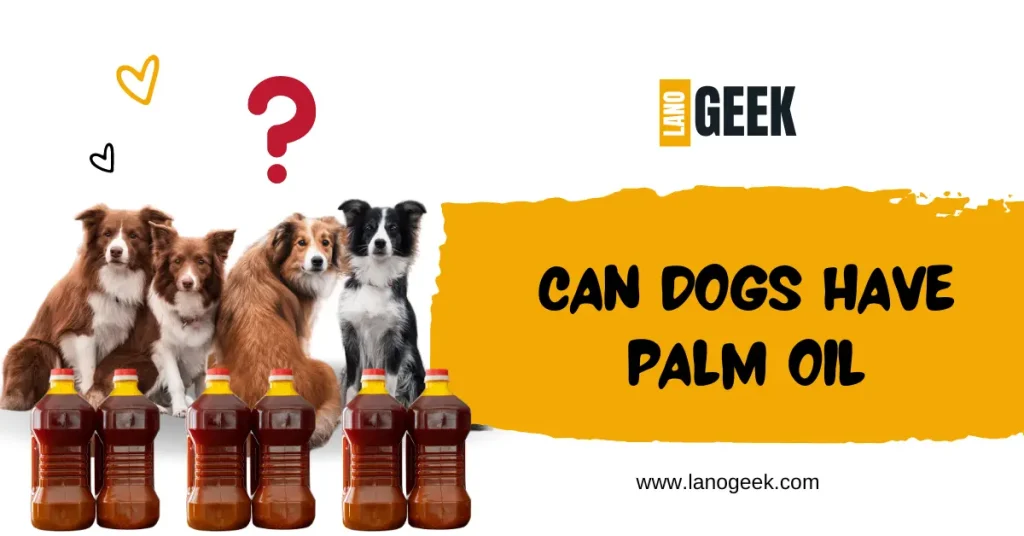Palm oil, an edible vegetable oil derived from the fruit of oil palm trees (Eales genesis), is more common in our lives than you might think. Originating from West Africa, palm oil is now predominantly grown in Southeast Asia, especially in Indonesia and Malaysia. This versatile oil is found in about 50% of packaged products in supermarkets, from food items and cosmetics to cleaning products and even biofuels. But while its widespread use makes it a staple in our daily routines, it also raises important questions about its safety and environmental impact. Lets explore everything you need to know about palm oil, its various uses, the potential risks it poses to dogs, and how to protect your furry friends from its harmful effects.
Recent read: Is vegetable broth good for dogs
Uses Of Palm Oil
Palm oil is a versatile ingredient that finds its way into numerous products across various industries.
- Food Production: Palm oil is a common ingredient in processed foods, baked goods, margarine, snack foods, confectionery items, and cooking oils. Its high smoke point and neutral flavor make it ideal for frying and sautéing.
- Cosmetics and Personal: Care In the realm of personal care products, palm oil and its derivatives are prized for their ability to create stable emulsions and impart a creamy texture to skincare items like soaps, shampoos, lotions, and cosmetics.
- Cleaning Products: You might be surprised to find palm oil in some household cleaning products, including detergents and soaps, where it serves as an effective cleaning agent.
- Biofuels: Palm oil is also utilized in the production of biodiesel, contributing to the renewable energy sector as a source of eco-friendly fuel.
- Industrial Applications: In various industrial processes, palm oil may be used for lubrication and as an ingredient in the production of items like candles and industrial waxes.
- Animal Feed: Palm kernel meal, a byproduct of palm oil production, is incorporated into some animal feed formulations to provide essential nutrients.
- Pharmaceuticals: Even in the realm of pharmaceuticals, palm oil may play a role as a carrier for fat-soluble vitamins and medications. Its versatility knows no bounds across a wide spectrum of industries.
Palm Oil In Pet Products
Palm oil has found its way into the pet industry, making appearances in various pet products.
Pet Supplements: It’s increasingly common to find palm oil listed as an ingredient in pet supplements such as allergy relief chews, joint mobility treats, and multivitamins. However, the specific effects of pure palm oil in these supplements on dogs remain uncertain, as there is limited research on its health benefits or risks.
Health Impact Uncertain: Despite claims by some pet companies regarding the health benefits of palm oil for dogs, scientific evidence supporting these claims is lacking. While palm oil may serve as a filler in pet supplements, its actual impact on canine health is yet to be definitively determined.
Marine Discharge: Palm oil can legally be discharged into the sea by ships, leading to the formation of “palm oil bergs” that wash ashore on beaches. These semi-solid lumps of palm oil can absorb toxic materials such as diesel, bacteria, and waste from the sea, posing a serious threat to dogs if ingested.
Contamination: The palm oil bergs that wash up on beaches can become contaminated with harmful substances, making them particularly dangerous for dogs. Ingesting these contaminated lumps can lead to severe health issues and complications.
Ingestion by Dogs: Dogs that consume contaminated palm oil bergs may experience a range of symptoms, including gastrointestinal distress, dehydration, pancreatitis, and even obstruction of the digestive tract. These symptoms can be severe and require prompt veterinary attention.
Symptoms Of Poisoning
Palm oil poisoning in dogs can manifest in various symptoms, indicating potential health issues.
Gastrointestinal Distress
Consuming palm oil or contaminated palm oil can lead to gastrointestinal problems in dogs, including:
- Diarrhea
- Vomiting
- Abdominal discomfort or pain
- Loss of appetite
Pancreatitis
An excessive intake of fatty foods like palm oil can increase the risk of pancreatitis in dogs, characterized by:
- Severe abdominal pain
- Repeated vomiting
- Loss of appetite
- Lethargy
Obstruction
Solidified palm oil or large chunks ingested by dogs can cause obstructions in the digestive tract, leading to symptoms such as:
- Vomiting
- Diarrhea
- Abdominal pain
- Lethargy
Dehydration
Vomiting and diarrhea resulting from palm oil ingestion can lead to dehydration, indicated by:
- Increased thirst
- Dry mouth and gums
- Sunken eyes
- Reduced skin elasticity
Conclusion
In conclusion, palm oil presents both health risks for dogs and significant environmental concerns. While small amounts of food-grade palm oil are generally safe, ingestion of contaminated palm oil or large quantities can lead to severe gastrointestinal distress, pancreatitis, obstruction, and dehydration in dogs. Recognizing the symptoms of palm oil poisoning is essential for pet owners to seek prompt veterinary care and intervention. Dog owners should be vigilant about preventing their pets from ingesting palm oil, especially contaminated forms found on beaches. Supervision, lead control, and avoidance of unfamiliar items on beaches are essential precautions to protect dogs from palm oil ingestion.






